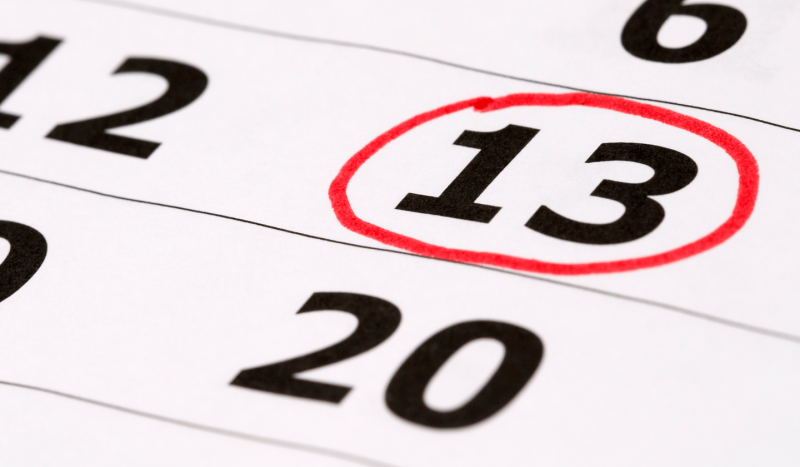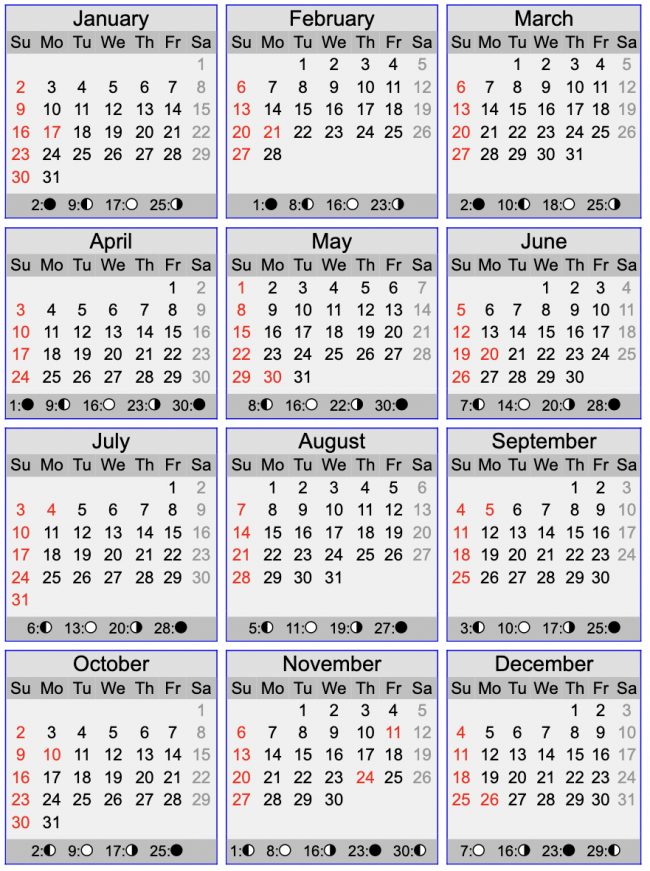
Friday the 13th
It’s inevitable. Any common year of 365 days – that starts on a Saturday – has a solitary Friday the 13th in the month of May. 2022 started on a Saturday. And 2022 has 365 days. So, in this case, May 13, 2022 is our sole Friday the 13th for this year.
Plus! Any calendar month that starts on a Sunday harbors a Friday the 13th. And May 2022 started on a Sunday. Voila again. So, for this reason, we have a Friday the 13th this month.
Previously, the last time a common year sported a Friday the 13th in May was in 2011. Subsequently, after this year’s Friday, May 13, 2022, the next one won’t come until May 13, 2033.
In any given year, there’s always at least one Friday the 13th. So, how many Friday the 13ths can we have in a year? The answer is … three.
Two Friday the 13ths in a year last occurred in the year 2020 (March and November, 2020). And later, we’ll have two Friday the 13ths again in 2023 (January and October, 2023).
The last time three Friday the 13ths happened in one year was in 2015 (February, March and November, 2015), and will next take place in 2026 (February, March and November, 2026).

Friggatriskaidekaphobia
Not that we at EarthSky suffer from friggatriskaidekaphobia – an irrational fear of Friday the 13th – but there are lots of coincidences involving the calendar and Friday the 13th!
For instance, last year’s sole Friday the 13th – which fell on August 13, 2021, happened exactly 39 (3 x 13) weeks before this year’s only Friday the 13th on May 13, 2022. Next year, in 2023, the year’s second Friday the 13th on October 13, 2023, will come exactly 39 (3 x 13) weeks after next year’s first Friday the 13th on January 13, 2023.
That’s just the tip of the iceberg. We could showcase more instances involving the number 13 and Friday the 13th.

Rhyme and reason of the Friday the 13th cycle
The days of the week realign with calendar dates in predictable cycles. Let’s take the year 2022, and project the matching years for the rest of this century. In other words, we’re looking for years whereby the calendar starts on a Saturday, and the month of May begins on a Sunday.
The year 2022 comes two years after a leap year. Within the confines of the 21st century (2001 to 2100), any calendar year occurring two years after a leap year will find the days of the week realigning with calendar dates in cycles of 11, 17 and 28 years.
Therefore, a sole Friday the 13th will recur in the month of May in 11, 17 and 28 years:
Friday, May 13, 2033 (2022 + 11)
Friday, May 13, 2039 (2022 + 17)
Friday, May 13, 2050 (2022 + 28)
Don’t stop there. Continue the series onward:
Friday, May 13, 2061 (2050 + 11)
Friday, May 13, 2067 (2050 + 17)
Friday, May 13, 2078 (2050 + 28)
And onward:
Friday, May 13, 2089 (2078 + 11)
Friday, May 13, 2095 (2078 + 17)
Gregorian calendar perturbs the cycle
If the Julian calendar were still in use today, this cycle would continue indefinitely. That’s because the years 2100, 2200 and 2300 are 366-day leap years in the Julian calendar. Yet, by Gregorian calendar rules, these century years (2100, 2200 and 2300) are common years of 365 days.
Because 2100 is a common year of 365 days, the Friday the 13th cycle is perturbed. After Friday, May 13, 2095, the following May Friday the 13th will occur on Friday, May 13, 2101 (instead of Friday, May 13, 2106). Even so, we can pretend that 2101 comes one year after a leap year. Within a given century, any year coming one year after a leap year recurs in cycles of 6, 17 and 28 years (2107, 2118 and 2129).
Friday May the 13th in a leap year too!
A common year starting on a Saturday will always present a solitary Friday the 13th in the month of May. But so will a leap year starting on a Friday. This last happened in the year 2016, and will next take place in 2044. Within the confines of a given century, leap year Friday the 13ths repeat on the same calendar dates in periods of 28 years.
Bottom line: The calendar seems to have a life of its own when it comes to Friday the 13th and number play. Happy Friday the 13th!











